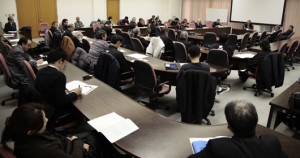On January 29, Tenri University Oyasato Research Institute for the Study of Religion held a special symposium on the overseas mission in the university’s Faculty Research Hall. Under the theme of “Current Situations and Challenges of Tenrikyo Overseas Mission,” the three bishops of the mission headquarters in America, in Brazil, and of Hawaii, spoke about current and future efforts in missionary work in each region.
Firstly, Bishop Hiroshi Alexander Fukaya of the Mission Headquarters in America took the rostrum. He talked about the present situation and future perspectives of missionary work in the U.S. mainland.
Bishop Fukaya started by introducing the mission headquarters’ activities and referred to its current challenges, saying: “In America, faith in the path initially spread mainly in the Japanese community. Over the generations, however, a communication gap has emerged between the generations who only speak Japanese and those who only speak English. Partly because of this, the faith is not being passed down as it should to younger generations even within families.”
He then pointed out another challenge: “In some states, gay marriage is legal. Also, the donation of sperms and eggs and surrogate birth are no longer unusual in American society. Accordingly, values concerning the marital relationship and the whole concept of husband and wife have diversified. It is imperative to think over how to approach such issues.”
From another perspective, Bishop Fukaya said: “Due to an influx of immigrants, the population of Caucasians is turning into a minority in America. The idea that you must know English to engage in missionary work is no longer true. I would like people who study such languages as Spanish and Chinese, as well as English, to set their sights on missionary work in America.”
He concluded by saying: “The Mission Headquarters in America will hold its 80th anniversary next year. It is important not only to pass down the faith to the next generation, but also to train and nurture people who learn and explain the teachings in their native languages. By making use of such tools as social networking services, I would like to proactively get young generations involved in the work.”
Secondly, Bishop Michihito Hamada of the Mission Headquarters of Hawaii spoke. He began by saying, “Those issues seen in the U.S. mainland also exist in Hawaii.” He then reported: “The security situation in Hawaii is getting worse with its deteriorating economy—the proliferation of drugs has become a serious social problem.” He emphasized the need to seek a way of spreading the teachings that will have a real impact on society in Hawaii, where half of the population are regarded as having no religious faith.
Bishop Hamada referred to Tenrikyo Hawaii Convention held for English-speaking followers two years ago as a catalyst to strengthen their connections to the faith. He mentioned that the number of followers who visit their churches has increased since the convention. He said: “Many of those followers previously had only a sketchy understanding of the teachings and could not deeply pursue their faith. I thus realize the importance of providing continuing opportunities for educating and nurturing them.”
Lastly, Bishop Yuji Murata of the Mission Headquarters in Brazil spoke: “There were about ten churches in Brazil when the mission headquarters was established in 1951. The number has grown to as many as 89, and the number of Yoboku is approximately 7,000 today. There are also 12 fellowship heads who are not of Japanese descent, which suggests that the teachings of the path are not confined to the Japanese community but are gradually seeping into wider Brazilian society.”
He then explained: “About 80 percent of the head ministers, Yoboku, and other followers in Brazil do not understand Japanese. Besides offering a variety of training courses at the mission headquarters, we encourage local followers to study at Tenrikyo schools in Japan, such as Tenri University and Tenri Language Institute, so that each church has at least one member who is able to serve as an interpreter.” He added, “I also want young Japanese people to come to Brazil for missionary work and inspire local missionaries.”




